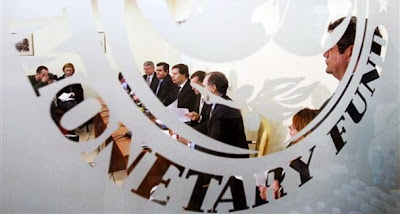Thursday, December 31, 2009
Pakistan receives fourth IMF tranche of $1.2bn
KARACHI: Pakistan has received the fourth IMF tranche of $1.2 billion, pushing the foreign exchange reserves close to the highest mark that the country attained in 2006-07.
“State Bank has received $1.2 billion from IMF as part of its package for Pakistan,” said Syed Wasimuddin, chief spokesman for the central bank.
Pakistan had requested for an emergency loan from the IMF in November 2008 as its reserves eroded due to high price of petroleum products.
The country’s reserves depleted fast and the current account deficit crossed the dangerous level.
The IMF agreed to entertain Pakistan’s request but made it mandatory for the country to maintain a high interest rate to avoid hyperinflation for consolidation of economy.
“The $1.2 billion inflow was the fourth tranche of the IMF,” said the spokesman.
Pakistan initially signed an agreement for $6.7 billion emergency help and the money was meant for current account deficit. However, later the aid was increased to $11.3 billion allowing the government to spend some of the aid for fiscal expenses. The current account deficit remained well under control during the current fiscal year.
According to State Bank report, during the first five months (July-Nov) it was 82 per cent lower than the deficit during the same period last year.
Analysts said the foreign exchange reserves level was satisfactory and would help the economy from any shocks like oil price boom which hit the country so badly that it had to go for emergency borrowing.
“With the inflow of $1.2 billion, the country now has over $15 billion as foreign exchange reserves that is close to $15.7 billion it had in 2006-07,” said Abid Saleem, a research analyst.
Analysts were of the view that low current account deficit which would consume less amount of foreign exchange reserves, was mainly due to low import and not because of higher exports.
They said import has massively declined during the first five months of the current fiscal year while the low oil prices also helped the country to minimise the impact of current account deficit.
Both exports and imports have been declining since beginning of new fiscal year, reflecting the slow economic growth which would ultimately reduce country’s ability to make foreign payments and once again approach the donors for help, they said. “The higher foreign exchange which was built mostly by borrowing is not sustainable for any longer period as it will make the problem further severe once the country will start paying back the loan with interest,” said Abid.
He said the long term solution requires higher productivity and higher exports with minimum imports.
The analyst said the drying up of foreign direct investment and lower exports will impact badly the balance sheet of the country.
They said the recent financial meltdown of Dubai will also cast a negative impact on remittances as hundreds of Pakistanis lost their jobs while their business in this trading hub of Middle East also got hurt.
Pakistan remained lucky as its remittances have increased by 30 per cent during the first five months which is against the global trend.
The financial meltdown which started from United States deprived millions of their jobs in the US, Europe and other developed countries which ultimately reduced remittances.
Subscribe to:
Post Comments (Atom)

No comments:
Post a Comment